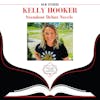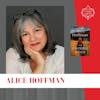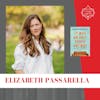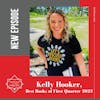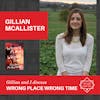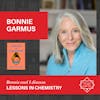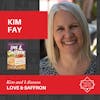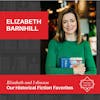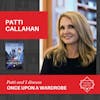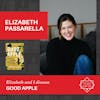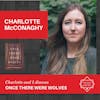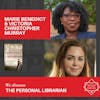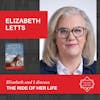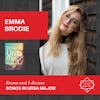Elizabeth Crook - THE MADSTONE

In this interview, I chat with Elizabeth Crook about The Madstone, Texas during Reconstruction, how she wanted to write another book with Benjamin Shreve as a central character, the definition of a madstone and how she chose that as her title, her personal connection to the cover, and much more.
In this interview, I chat with Elizabeth Crook about The Madstone, Texas during Reconstruction, how she wanted to write another book with Benjamin Shreve as a central character, the definition of a madstone and how she chose that as her title, her personal connection to the cover, and much more.
Elizabeth's recommended reads are:
- Big Wonderful Thing: A History of Texas by Stephen Harrigan
- Remember Ben Clayton by Stephen Harrigan
Want to know which new titles are publishing in January - May of 2024? Check out the new Literary Lookbook which contains a comprehensive but not exhaustive list all in one place so you can plan ahead.
Join my Patreon group to support the podcast. Other ways to support the podcast can be found here.
The Madstone can be purchased at my Bookshop storefront.
Connect with me on Instagram, Facebook, and Threads.
Send your top read of 2023 recording to me at cindyhburnett@att.net with Favorite Read of 2023 as the subject line. The episode will run in early December.
Learn more about your ad choices. Visit megaphone.fm/adchoices
[00:10] Cindy: Hi, reader. I'm Cindy Burnett. Welcome to my award-winning podcast, Thoughts From a Page, which is a member of the Evergreen Podcasts Network. On the show, I chat with authors whose books I have enjoyed about their new releases, and I give you a peek behind the curtain of the publishing industry with my Behind the Scenes series. With so many books coming out weekly, it can be hard to decide what to read, so I find the best ones and share them with you.
If you're looking for a community of readers, bonus content, and a chance to read books before they hit the shelves, I hope you will consider joining my Patreon group, which is filled with a wonderful bunch of book lovers. The link to join is in the Show Notes. Do you love to be in the know about upcoming books? Kelly Hooker of @kellyhook.readsbooks and I do too. We couldn't find a comprehensive list of titles all in one place, so we made one ourselves, and now we're sharing it with you. Our Literary Lookbook is a list of 182 books releasing from January to May 2024, curated for our communities. The link to buy it is in my Show Notes.
Today, Elizabeth Crook joins me to chat about The Madstone. From page one, I was completely immersed in this book, and the story's narrator Benjamin Shreve is now one of my favorite fictional characters. His voice is so unique and compelling. Elizabeth has written six novels, as well as for periodicals such as Texas Monthly and the Southwestern Historical Quarterly. She has served on the council of the Texas Institute of Letters and the board of the Texas Book Festival. She's a member of Women Writing the West and Western Writers of America. This year, Elizabeth received the prestigious Texas Writer Award from the Texas Book Festival. I hope you enjoy our conversation.
And now, before we get started with the interview, I want to let you know about something new that I am trying this year, this week and next week. I am asking for anyone who is interested to record a blurb about your Top Read of 2023 or one of your top reads. If you have more than one want to participate? Make a voice memo recording on your phone. Find a quiet place in your home like a closet with no kids or animals around so that your recording is solid and clear and doesn't have a lot of echo. Please give me your name, where you are from, and the book. Don't forget the title and the author that is your top or one of your top reads of 2023. Quickly give a summary of the book and then tell me why you chose it as one of your top reads of the year. Please make sure the recording is under three minutes long. I find it helpful myself to make notes and practice a little bit ahead of recording. When you are finished, email the recording to me at cindyhburnett@att.net with Favorite Read of 2023 as the subject line. The episode will run in early December, so stay tuned.
Welcome, Elizabeth. How are you today?
[02:56] Elizabeth: I am fine, thank you, Cindy. How are you?
[02:59] Cindy: I'm thrilled to pieces to be chatting with you because The Madstone will be one of my top reads of the year. I just loved it.
[03:06] Elizabeth: Thank you. It is so nice to hear that from early readers who have read know before it's out and before you have a real sense of how it's going to do. So that's encouraging. Thank you very much.
[03:16] Cindy: Absolutely. I loved it so much that I couldn't even start another book for a day or two because I knew I wasn't going to like whatever book it was as much as this one. I was still thinking about all of the characters spending time in Texas with them, and I just couldn't move on.
[03:29] Elizabeth: Well, you should see the smile on my face right now. So I appreciate that.
[03:33] Cindy: And Kirkus gave the book a beautiful starred review. You had to be thrilled with that as well.
[03:38] Elizabeth: I was very thrilled with that. And the thing that I loved the most about that was a little reference, a sentence made right in the middle of the review, kind of buried. And it probably wouldn't mean so much to anybody else, but it said, the guiding spirit here is Dickens and how a reviewer would be able to discern the number of hours I spent as a teenager and in my 20s reading Dickens novels. I don't know or why that would bleed into a book about Texas in the Reconstruction era, which is very, very far from the Dickens novels, but the fact that they sort of picked up on something that made them feel that, it was just kind of astonishing to me. So my hat is off to that reviewer, whoever they are. You never know who reviewed your books, but I appreciate that reviewer.
[04:23] Cindy: Okay. That is actually pretty astonishing.
[04:26] Elizabeth: Yes.
[04:26] Cindy: Can you give me a quick synopsis?
[04:28] Elizabeth: Of the I mean, it's an adventure. It's a love story. It takes place during Reconstruction era in Texas, begins in the Hill Country and goes all the way to the coast and sort of in a straight linear line. It's all action. You're just moving from one town to another. But many, many things happen along the way. So essentially, Benjamin Shreve, who is a 19 year old who's working as a tradesman as a carpenter in Comfort, Texas, witnesses this stagecoach roll in across the street as the stagecoach stop from across the street from where he's working rolls in and it leaves behind a passenger who has gone into the privy. And this passenger is desperate to get to the next town and catch up with the stagecoach because he has left on the coach a very special bag. We don't know what's in the bag at the time, but we come to learn that this passenger, Dickie is a treasure hunter, and there's something in this bag that he has to catch up. You know, he hires Benjamin to take him in his wagon and get him to the next town. Well, before they get there, they come on the stage, but the stage has been held up. And so stranded there with the stage and the stagecoach driver is a young woman, Nell, who has her son with her, her young son, and she is pregnant. And so Benjamin now has these other passengers to get to the next town. At every town they get to, there's a reason why they have to keep fleeing, because Nell is running away, it turns out, from a very abusive situation. Her husband's family is involved with a gang in East Texas called the Swamp Fox Gang. This was a real gang in Texas history. They basically preyed on freedmen and freed women and on people who know part of the government, the Freedmen's Bureau, who had come down to make sure that the laws were being abided by. So she has to get out of Texas because she has informed on where the Swamp Fox Gang has been hiding in the swamps. That's what they did. They came out, and they committed murders and all kinds of atrocities. So this becomes the journey for Benjamin and for Nell and her young son, Tot, as they try to reach and for the treasure hunter and one other passenger they end up with along the way, who is a Black Seminole who plays an integral part in the story. And they have to get all the way to Indianola, where Nell hopes to get on a ship and escape to New Orleans.
[06:59] Cindy: How did you come up with the idea for this story?
[07:02] Elizabeth: I get ideas as I go. It's like, what's going to happen next? I wanted to work with this character, Benjamin, again. He's a character in my story, The Which Way Tree, and I loved this young man. He's 17 years old in The Which Way Tree, and he's 19 years old here. So I just wanted to age him up a little bit, give him a chance to have a first love and to see the world through his eyes for a longer period of time. I mean, he's a very endearing character, and I missed him when I finished writing that book. So that's why I came up with the story. It needed to take place during Reconstruction. I started doing a lot of reading about the Reconstruction era in Texas and came across the existence of these gangs. The Swamp Fox gang was not the only one. There were several. And know what would I do? What would it be like if I was in the situation that Nell is in and you know that these terrible crimes are being committed, or, you sense know, you don't even really know when you crossed over from thinking they might be to knowing that they are. And at what point do you have the courage, knowing that there's going to be retribution against you, to go to the law and report your husband and his family for what they're doing? So I just got interested in that idea because I think none of us ever know how we would behave in certain instances. We can hope and think we would do the right thing and then we would do it soon. But you don't know because fear plays a big part in these things. But eventually her own sense of guilt catches up with her and that's what she has done. And now they are after her and want to take her son, which is, of course, the most threatening thing to a you know, that becomes her story.
[08:52] Cindy: Well, you mentioned Benjamin and how much you loved him. And he is now one of my favorite fictional characters of all time. I just adored him. He's so funny, but he's also very clever and thoughtful. I mean, just a beautiful character.
[09:07] Elizabeth: He is. And the reason that he's funny is because he doesn't know he's funny and he doesn't even have a huge sense of humor. It's just that he's so deadpan in his delivery of what he's seeing and hearing and what's happening around him and how to, in a moral way and in a conscientious way respond to these events and how to do the right thing. And it's always about how to get further down the road with no money and with huge accidents with the weather and the wagon and different things that happen. And he's constantly having to make things work. And so when he relates all of these events, some of them extremely violent when the brothers catch up with him but he relates them in such a way, I think that it's kind of okay. I mean, you feel like you're in the hands of a storyteller. Who's going to hand it to you straight, who's not just trying to pull all the strings and make you sad or depress you or horrify you. They are telling you what happened and how it happened. I think it's his method of doing that. And it comes across as very funny. I mean, I remember when my mother started reading The Witch Way Tree and was an early draft and I gave it to her and I hadn't shown it to many people and some very violent things were happening. And she looked at me and she said, am I supposed to be laughing? She said, I'm laughing. And I feel bad about laughing, but I'm laughing. And I said, yes, because Benjamin doesn't he doesn't know he's funny. He's not trying to be humorous. He doesn't chuckle at himself. And in fact, when the person who did the audio, who is lovely, by the way, Will Collier is his name and he's an actor, and they let me listen to some auditions. And then once I heard his, I know that this guy can pull this off, he asked me about the voice, or I said, Can I talk to him before he does this? And they said, well, it's a little unusual, but yes. And he agreed to that. And so he said, well, how do you hear the voice? And I said, I hear it in a fairly deadpan way. And I know that you probably have to put a little more acting into it, but it's just important to know that Benjamin's very earnest, he's very sincere, he's very dutiful, and he's not trying to entertain. He's trying in an honest way to relate the know. And that's the way he reads just does. He really captures it perfectly.
[11:32] Cindy: Now you're making me think I'm going to have to go back and listen to it as well.
[11:36] Elizabeth: He's good. I mean, I know people who have listened to it twice now. I don't know about this one. I haven't listened to this one, and I actually haven't listened to The Witch Way Tree. I've just listened to the first little segment, like whatever's on audio when you can listen to a little sample. But everybody has told me that he's perfect, and so I've been really pleased. And then I requested him to do this one because it needed to be the same voice, it's the same character.
[12:02] Cindy: An audiobook can make or break a story. So I think that's wonderful that he is skilled at it. And yes, I think that's what I like so much about Benjamin. He is so earnest and he's so funny, but he doesn't always mean to be funny, and you're just laughing sometimes, as your mom said, when terrible things are happening. But the way he relays it does make you laugh.
[12:21] Elizabeth: I mean, I was chuckling when I was writing really violent scenes. I just thought they were very funny. And I have to say, those scenes that I was laughing at that were funny, the violence was happening to some really bad people. So that also makes it okay.
[12:37] Cindy: It helps, for sure. No, I agree with that. I'd love to hear how you decided to have Benjamin relay the story to Tot, because it's told from the point of view of Benjamin, but he's going back and revisiting the entire trip from beginning to end with no spoilers. But I was curious how you decided on that format.
[12:54] Elizabeth: Okay, so I wanted the story to be in Benjamin's voice, and so there needed to be a reason for him to be telling the story because he wouldn't have just at 19, sat down to write this, his recollection of this journey without a reason. And so the little boy, he becomes very bonded with the little boy, Tot, on the trip, and he is writing to Tot to be read when Tot becomes 19, because there are many things he's learned on this trip that he thinks Tot is going to want to know when he's grown. Sometimes when we have too many questions about our lives and how things unfolded the way they did, it's worrisome because you can't let them go. You can't find an answer, and he wants to say, here's what happened and here's why it happened. The things I know that you were too young to know. And you can read this when you're 19 years old. And that seems like a mature enough time to be able to read this because there were adult things involved and various other pieces of information that might be disturbing to a child but that he could handle at 19, which I loved.
[14:06] Cindy: I really like reading stories that are formatted that way, so I was just curious how you would decide to do it. And Benjamin has the best voice, so, I mean, him telling the story works quite well.
[14:15] Elizabeth: Thank you.
[14:16] Cindy: Who was the hardest character to write and who was the easiest to write?
[14:20] Elizabeth: Oh, wow. Well, Benjamin is for me, the easiest. I just know him so well, and after writing the I mean, I don't know his the way he sees the world is just so clear to me. I know what he's going to do in every situation. Immediately taught as a little boy was fairly easy. I've been around a lot of little boys. I raised a little boy. He's now 28 years old, so it was a long time ago, but you remember these things, and I have lots of great nieces and nephews for examples of how children react to things. I think Jorge was the hardest. He is the black Seminole character, simply the hardest because his story is the farthest from anything that I've ever experienced. And so it was a matter of learning a lot of history, for one thing, and just trying to get enough of the history in there without you'd. Never want to seem like you're giving the reader a history lesson. But to get enough of it across and to make him as authentic as possible. Given the fact that his life is very, very different from anything I would personally know about the Black Seminoles, it's a really fascinating history. They descended mostly from enslaved people who left, ran away basically from Mississippi or Georgia mostly, and fled down to Florida and were taken in by the Seminoles, and they actually became enslaved by the Seminoles, but in a very much freer format. They could have families. They became part of the Seminoles and the Seminoles were being driven out of Florida to go out west and be put on a reservation. And they finally know a lot of conflict. They finally did agree to this because they were promised all kinds of great things once they got out there. Well, of course none of that was true. They got out there and it was a terrible situation on the reservations. And so this group of Seminoles and Black Seminoles decided, we're just leaving. And they packed up, it was several hundred of them, and they hiked 900 miles from the reservation down to Mexico and there settled in a town called Nacimiento. And many of them were hired by the Mexican government to protect the border from outlaw people from the United States who were coming down there at this mean, there were lots of people fleeing retribution who had committed war crimes during the Civil War and they know want to be prosecuted. So they went down to Mexico and started committing depredations down there and crimes down there. So this was a border patrol against the Comanches and against the US citizen outlaws. And so he has joined up with that force. Now that's over, the Civil War is over and he can go as a free man back to the place of his origin, Florida, or where he eventually wants to go is to find his sister who was separated from him during some of the atrocities that were inflicted on them by Andrew Jackson and his cronies. So anyway, so Jorge meets up with them and he becomes an integral part of the journey.
[17:56] Cindy: He does. And I loved his character as well. I really liked all of them, all of the people that were good and obviously not Nell's husband, or her brothers, but I loved the people on the journey. And you really felt like you got to know them and they were very different from each other, but they worked well as a united troop.
[18:13] Elizabeth: Yes, they become kind know, like a family in a way, which is the same thing that happens in The Witch Way Tree and an adventure and disparate people put together and that form these unusual bonds.
[18:26] Cindy: Exactly. And I think I'm always drawn to those type of stories, which is probably why this one appealed as well.
And now for a quick break to take a moment and thank today's sponsor, Air Doctor. Americans spend an average of 90% of their time indoors and take approximately 20,000 breaths a day. According to the EPA, indoor air is two to five times more polluted than outdoor air, and in some cases, even up to 100 times more polluted. I struggle with allergies myself that poor air quality exacerbates. And so using my air purifier from Air Doctor really helps me manage my allergies. So what's the solution to poor air quality? Air Doctor has introduced an air purifier that has captured the attention of established media outlets such as CNN, Money, and more. Air Doctor filters out 99.99% of dangerous contaminants and allergens such as pollen, pet, dander, vesmite, mold, and even bacteria and viruses so your lungs don't have to all Air Doctor purifiers also feature Whisperjet fans 30% quieter than ordinary air purifiers. Want to breathe better? Head to Airdoctorpro.com and use promo code thoughtsfromapage. And depending on the model, you'll receive up to 39% off or up to $300 off exclusive to podcast customers. You will also receive a free three year warranty on any unit, which is an additional $84 value. Lock in this special offer by going to Airdoctorpro.com and use promo code thoughts from a page. Air Doctor also comes with a 30 day money back guarantee, so if you don't love it, just send it back for a refund minus the shipping. And now back to the rest of the show.
So The Madstone is such a fabulous and fascinating glimpse into Reconstruction-era Texas. What drew you to this time period and then did you have to do a lot of research related to it?
[19:59] Elizabeth: Yes, a whole lot of research. If you could see the room I'm sitting, just the books are stacked on the floor. They all have notes written in the back, because I read whole books on the law enforcement at that time, or these gangs during that time. And then I had to have books on each of the towns they passed through. I had to know a lot about San Antonio in 1868. And so you're really having to know. And then you have to, of course, figure out what to leave out, because you don't want to sound like you're just trying to relate a lot of history. So it's tricky because you learn it, it's exciting, it's interesting, but you can't put it all in there. And so the nice thing about writing in Benjamin's voice is Benjamin wouldn't be giving a history lesson. Benjamin wouldn't be explaining things. He would just say what they saw, what they heard and what's happening. So it helps me really cut it all down just to what matters to the story, what drives the plot forward, or informs the reader about the characters in a deeper way, without anything extraneous. But I have to know all that stuff so that I don't mis portray anything. I have to know how far they can travel and what the problems would be with the wagon and what they would do in certain situations when the wheel has a problem or whatever it is. You have to know all of that in order just to have a few lines about it. And I love the research. To me, it's almost the most fun part because you're looking for the little details that you can just put a detail in there and suddenly the whole scene is visible. So it's like this little treasure hunt. With every book you find these jewels. So, yeah, I read whole books on the history of Indianola and the history of all these towns. And then, of course, you have to know weaponry. And I don't know much about weaponry, but I have books on weaponry and you know, look things. Then, you know, sometimes it's just like, oh, okay, they've got to hitch up this mule. So then you go to YouTube, and, you know, you try to find somebody instructing on how you would hitch a mule to an old fashioned wagon. And so it's just all fun. It's all fun. But I don't remember the rest of the question I got off on. The part of it had to do with history. I got very excited, and I don't remember what well, I think I just.
[22:21] Cindy: Asked what drew you to the time period, but I think you answered that with everything you're talking about. And I'll tell you, the other thing that I love was I first learned about you and your book when I was at a conference at the Menger in San Antonio, which is an old hotel, and I'm reading the book eventually, and they stop at the Menger. And I just loved that. I was like, oh, that's where I first learned about the book. That's where she was talking about it, and here they are.
[22:44] Elizabeth: I know. I was so excited when I found out that conference was going to be at the Menger, because I'd finished writing the book, and I had done so much research on the history of the Menger. I mean, that was another one where you read a whole book on the history of that hotel to make sure you're getting things right. So when it was there, I was like, oh, this is just so great. To have the first event that I did for this book. That was the first thing I did for this book was that conference. But to have it there at the Menger, it just made me feel very much at home.
[23:11] Cindy: Well, and I loved it because I could completely visualize it because I had literally just been there. Of course, your story is taking place many years before, but still, the hotel is, I'm sure, in part the way it was then. So it was just very cool. I was like, they walked through the same doors that I did. Yeah, well, tell me about the title. I had to look up what a madstone was as I was reading.
[23:30] Elizabeth: Right, okay, good point. So a madstone is they are basically like if you think of a bladder stone or a kidney stone or a gallstone, something like that, so they form in the bellies of deer and other ruminant animals. If in the old days you killed a deer, especially if it was an albino deer, and it had a madstone in its stomach, that was an incredibly valuable thing to find because they were believed to draw the toxins out of a rabbit animal's bite. And some people believed that they also would draw toxins out of snake bites and everything, but they were most known. That's why they were called a madstone, because when somebody was know, a rabbit animal was called mad. So they would be applied to the bite if one could be found. They were rare, and they were brought over from Europe a lot of times, passed down in families and kept locked up in secure places like a church, because nobody wanted them to be stolen or lost, because it was potentially lifesaving. And it wasn't, of course, but it offered hope. Hope is really all there is. If you're bitten by a rabid animal, there were enough times when either the animal turned out maybe wasn't rabid or the bite wasn't deep enough or for whatever reason somebody didn't die, there were enough times that happened that madstones came to be believed in, because there is no cure for rabies. I mean, there wasn't at that time. There was no cure. And so if you had a madstone, you at least had some hope until things took a bad turn.
[25:07] Cindy: And I obviously know what happens in the story, but how did you decide to use that as the title?
[25:12] Elizabeth: Well, it's just a cool title, and it was a turning point in the book. It was an important point in the book, and I felt it's a mysterious object. And I don't know, I just kind of liked that title. And my editor really loved the title. I didn't tell him what the book was for a long time because I just wanted to keep it to myself. And so finally, when I was finished and I said, I'm about to finish it and send it to you, the title is The Madstone. And he said, oh, I love this title. I said, well, that's two words we don't have to argue about then, because sometimes go back and forth about other things in the manuscript. So I was glad at least to have those two down, two good ones to start out with, and two of the most important.
[26:02] Cindy: If people haven't read the book yet, like if you've got The Madstone, that's the title. So that's the first thing people see. So, yes, that's awesome if you don't have to argue about it, right? And the stunning cover. Do you just love it?
[26:15] Elizabeth: The cover? Yes. So here's the thing. It was so interesting. We went back and forth on many things about the cover and it needed to be made dangerous enough and like, something's happening. There's something on the horizon. It's not just a sunny day. There's maybe a storm approaching. There had to be some sense of an adventure rather than just a pastoral image. So they gave it that with the very colorful sky. And those clouds are called mimatus clouds from mammary gland, because they look like little boobs hanging out of the sky, basically. And we do see those in Texas sometimes, but they needed to have figures that were dressed appropriately for the 1860s, and you can't lift those out of any other image. We needed a couple of people. We needed the child. And. Two people on horseback. I said, well, what if I just get some of my family and we have horses and we can just put them in the right clothes and put them on the horses, and then maybe y'all could use the images to lift those out. So to my surprise, they liked the know we did that. So that's my niece Amy on the cover And then Amy's sister Christine was taking the pictures, and her husband Joe is on the other horse. And then the little boy belongs to Amy and her husband Thomas. And they just mounted up, and we took a bunch of pictures of them riding around in circles in front of a blank barn and then just like the side of a barn as blank of a background as we could get. And then they very skillfully at little brown lifted those images out of those pictures and planted them into they had to do a lot of things. They had to muddy up Dot shirt and it was shading and different things. They made some changes to make it look like they were walking on this path of this scene that had already been created.
[28:18] Cindy: Okay. I love that. And they probably love that they are now starring on your cover.
[28:22] Elizabeth: Yes. Well, the little boy Tripp is very pleased. He does think he's a star.
[28:27] Cindy: Exactly.
[28:28] Elizabeth: We've made a big deal about for Tripp, and he's been delighted.
[28:32] Cindy: I love that. And the font that The Madstone and your name are written in. I just think it's an absolutely stunning cover.
[28:38] Elizabeth: Oh, good. Yeah, I do, too. I was really happy. And you don't, as a writer, have a lot of control over that. Publishers will always ask how you feel about it, and then if you don't agree with them, it's like, okay, thank you. Thank you for your opinion. This time they really let me sort of weigh in some, and I was very appreciative of that. But I loved their work, their cover.
[29:02] Cindy: Me too. Well, you're going to be receiving the 2023 Texas Writer Award this year at the Texas Book Festival. That is so exciting. It's given to a Texas writer in recognition of outstanding contributions to Texas literature. Congratulations.
[29:17] Elizabeth: It's a really nice award, and I love the Texas Book Festival, so it's really meaningful to me. I think I've been to every book festival since it started 20 something years ago, and usually either moderating or attending with a book or quite often just hanging out and visiting with friends, other writers who are there. Texas has a cohesive writing group we all, like, each know, and then there's just always a lot of know writers who come from all over who are interesting to listen to. So I've been every year, so it makes me feel really at home there and really proud of this award.
[29:58] Cindy: They give you some kind of special cowboy boots, is that correct?
[30:01] Elizabeth: Yes. These are going to be custom made cowboy boots with the seal of the book festival and some decorative things on them. It's all hand sewn and everything. I've never had custom made cowboy boots, so I'm pretty psyched about it. Really.
[30:17] Cindy: You're going to be wearing those everywhere?
[30:19] Elizabeth: I think I probably will be. You don't want to seem like you're just bragging, but if you've got really cool boots, you definitely want to wear them. So I'll have to weigh exactly where I feel. Okay. And it doesn't seem like I'm just walking around as an advertisement to myself.
[30:39] Cindy: Look at my boots and ask me why I have them. Well, that is very exciting and huge. Congratulations.
[30:49] Elizabeth: Thank you, Cindy.
[30:50] Cindy: Well, before we wrap up, Elizabeth, what have you read recently that you really liked?
[30:54] Elizabeth: Oh, okay. So I've gone back to finish a book that I had not finished because I had gotten sidetracked with the ending of The Madstone with writing the end of The Madstone, and it is Steve Harrigan's Big Wonderful Thing, and it is the history of Texas. It's called Big Wonderful Thing. And it's just beautifully written. And each segment I mean, it's a big, fat book, and each segment, each era that he covers is like a whole story in itself. And the characters, it's very character driven. You meet all these characters from Texas history that you had never heard of and who had these enormous accomplishments and fascinating lives and who changed the state in one way or another. So it's very character driven stories, and it just tells from the very beginning, as far back as he could research to present day or almost present day. So I had been really engaged reading it as just little sections every night before bed, because each one reads like its own little piece of history. And then I thought, okay, now I'm enormously focused now on finishing this book. And so I put it aside, and I've just now taken it back up and find it just as engaging as I did before, so I will be able to finish it now.
[32:19] Cindy: I've heard wonderful things about his writing, and I've never read him, but you're reminding me that I really need to.
[32:24] Elizabeth: He's a really great writer. I mean, he's been probably the biggest influence on my work. For one thing, he's a very close friend of mine. We trade manuscripts back and forth as we're writing, and we wrote the screenplay for The Witch Way Tree together. I personally just think he's one of the greatest people ever, but objectively, I also think he's pretty much one of the greatest writers. Well, absolutely one of the greatest writers. Maybe the greatest writer we have currently in Texas.
[32:56] Cindy: Well, that's quite an endorsement. Okay, I'm bumping him up my list, and I will start with the one.
[33:00] Elizabeth: That you're yeah, I mean, it's a big history, and it's nonfiction, but it is really great. And there's another one if you liked this story that takes place. It's a West Texas story called Remember Ben Clayton? Which is a wonderful, wonderful story. His first book was a national bestseller, was called The Gates of the Alamo.
[33:20] Cindy: Oh, that's right. I've seen that one before. I haven't read it, obviously, but I have seen it.
[33:24] Elizabeth: It's kind of become a classic.
[33:26] Cindy: Okay, good. Well, I may try to listen to this latest one, too, because that's kind of a good way, I think, to digest information like that.
[33:33] Elizabeth: Yes. Yes.
[33:34] Cindy: Well, thank you so much, Elizabeth. I cannot wait for your book to be out in the world so I can tell everyone I know to read it. I actually had an event last night where I went and talked about reading recommendations, and I included yours because I was like, It's not out quite yet, but you really need to make sure you get this one. So I just can't wait for everybody to be able to read it.
[33:51] Elizabeth: Thank you, Cindy. That's great. I appreciate that.
[33:54] Cindy: Absolutely. And thanks for coming on my show. Thank you so much for listening to my podcast. I would love to connect with you on Instagram or Facebook, where you can find me @thoughtsfromapage. If you enjoy this show, please consider joining my Patreon group to access bonus content and support the podcast. If you have a moment to rate the show or subscribe to it wherever you listen to your podcasts, I would really appreciate it. It makes a big difference. And please tell all of your friends about Thoughts From a Page. Word of mouth does wonders to help the show grow. The book discussed in this episode can be purchased at my Bookshop storefront, and the link is in the show notes. I hope you'll tune in next time.
New to Thoughts from a Page Podcast?
Here are some great episodes to start with.






















